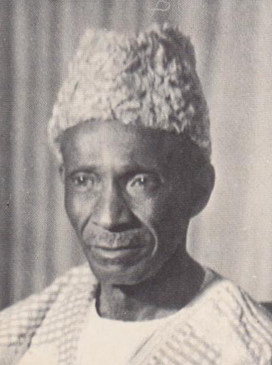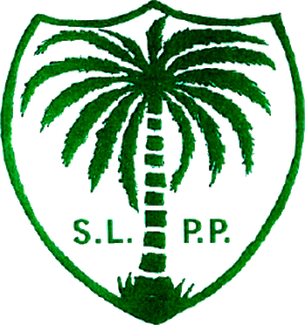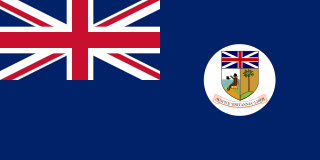 |
|---|
General elections were held in Sierra Leone Colony and Protectorate in November 1951.
 |
|---|
General elections were held in Sierra Leone Colony and Protectorate in November 1951.
The 1947 constitution expanded the Legislative Council to 35 members, of which seven were government officials, seven were appointed Europeans, fourteen were Africans indirectly elected from the Protectorate (ten from District Councils and two from the Protectorate Assembly) and seven were Africans directly elected from the Colony. [1] Around 5,000 people were registered to vote. [2]
Only five of the seven directly-elected constituencies were contested, with candidates running unopposed in two of the rural constituencies. [2]
The National Council (NCSL) won three of the seven elected seats, and the Sierra Leone People's Party (SLPP) two. [3] However, the SLPP gained the support of the indirectly elected protectorate representatives. [4]
A total of 3,276 votes were cast; 2,438 in the three Freetown constituencies and 838 (550 and 288) in the two contested rural constituencies. [2]
| Party | Votes | % | Seats | |
|---|---|---|---|---|
| National Council | 3 | |||
| Sierra Leone People's Party | 2 | |||
| Independents | 2 | |||
| Indirectly-elected members | 14 | |||
| Appointed members | 7 | |||
| Government officials | 7 | |||
| Total | 35 | |||
| Total votes | 3,726 | – | ||
| Source: Wyse, Sternberger et al. | ||||
| Party | Elected member |
|---|---|
| Directly-elected | |
| National Council | Herbert Bankole-Bright |
| C M A Thompson | |
| J Rogers Williams | |
| Sierra Leone People's Party | A G Randle |
| M S Mustapha | |
| Independents | I. T. A. Wallace-Johnson |
| J C O Crowther | |
| Indirectly-elected | |
| Bo District | R B S Koker |
| Bonthe District | Milton Margai |
| Bombali District | Bai Farima Tass II |
| Kailahum District | Bokari Sambi of Daru |
| Kenema District | Kenewa Gamanga |
| Moyamba District | W H Fitzjohn |
| Port Loko District | Alkali Modu III |
| Pujehun District | Jaia Kaikai |
| Tonkolili District | Bai Kurr |
| Protectorate Assembly | Siaka Stevens |
| Albert Margai | |
| Source: Wyse | |
The SLPP's Milton Margai was appointed Chief Minister in 1953.

Sierra Leone, officially the Republic of Sierra Leone, is a country on the southwest coast of West Africa. It shares its southeastern border with Liberia, and the northern half of the nation is surrounded by Guinea. Covering a total area of 71,740 km2 (27,699 sq mi), Sierra Leone has a tropical climate, with diverse environments ranging from savanna to rainforests. The country has a population of 7,092,113 as of the 2015 census. Freetown is the capital and largest city. The country is divided into five administrative regions, which are subdivided into 16 districts.
Sierra Leone first became inhabited by indigenous African peoples at least 2,500 years ago. The Limba were the first tribe known to inhabit Sierra Leone. The dense tropical rainforest partially isolated the region from other West African cultures, and it became a refuge for peoples escaping violence and jihads. Sierra Leone was named by Portuguese explorer Pedro de Sintra, who mapped the region in 1462. The Freetown estuary provided a good natural harbour for ships to shelter and replenish drinking water, and gained more international attention as coastal and trans-Atlantic trade supplanted trans-Saharan trade.

The government of Sierra Leone is the governing authority of the Republic of Sierra Leone, as established by the Sierra Leone Constitution. The Sierra Leone government is divided into three branches: the executive, legislative and the judiciary. The seat of government of Sierra Leone is in the capital Freetown.

Sir Milton Augustus Strieby Margai was a Sierra Leonean medical doctor and politician who served as the country's head of government from 1954 until his death in 1964. He was titled chief minister from 1954 to 1960, and then prime minister from 1961 onwards. Margai studied medicine in England, and upon returning to his homeland became a prominent public health campaigner. He entered politics as the founder and inaugural leader of the Sierra Leone People's Party. Margai oversaw Sierra Leone's transition to independence, which occurred in 1961. He died in office aged 68, and was succeeded as prime minister by his brother Albert. Margai enjoyed the support of Sierra Leoneans across classes, who respected his moderate style, friendly demeanor, and political savvy.

The Sierra Leone People's Party (SLPP) is one of the two major political parties in Sierra Leone, along with its main political rival the All People's Congress (APC). It has been the ruling party in Sierra Leone since 4 April 2018. The SLPP dominated Sierra Leone's politics from its foundation in 1951 to 1967, when it lost the 1967 parliamentary election to the APC, led by Siaka Stevens. Originally a centre-right, conservative party, it identifies since 2012 as a centre-left social democratic party, with a centrist tendency.

Siaka Probyn Stevens was the leader of Sierra Leone from 1967 to 1985, serving as Prime Minister from 1967 to 1971 and as President from 1971 to 1985. Stevens' leadership was often characterized by patrimonial rule and self-indulgence, consolidating power by means of corruption and exploitation.

Elections in Sierra Leone are held on a national level to elect the president and the unicameral Parliament. Sierra Leone has a multi-party system, with two or three strong parties.
Sir Albert Michael Margai was the second prime minister of Sierra Leone and the half-brother of Sir Milton Margai, the country's first Prime Minister. He was also the father of Sierra Leonean politician Charles Margai.

Parliament of Sierra Leone is the legislative branch of the government of Sierra Leone. It is principally responsible for making laws. The Sierra Leone parliament consists of 149 members, of which 135 members are directly elected from across Sierra Leone's 16 districts, while 14 are paramount chiefs appointed from the 14 rural districts. The parliament is led by the Speaker of the House; the position is currently held by Abass Bundu of the Sierra Leone People's Party. The current elected 135 ordinary members of parliament are composed of members of the All People's Congress and the Sierra Leone People's Party which are the two largest political parties in Sierra Leone.
Kono Progressive Movement was a political party in Kono, Sierra Leone, that emerged in the mid-1950s with the backdrop of the expansion of diamond mining activities there are the growing feeling amongst a section of the Kono people that they were not reaping the benefits of the diamond boom. KPM was led by Tamba Sungu Mbriwa. The movement became part of the political opposition, as there was a break between it and the ruling Sierra Leone People's Party only a few months after the founding of KPM. Prominent figures in the area, such as Tamba Ngegba, J.S. Kpakiwa and T.R. Foyoh.
The National Council of Sierra Leone was the main opposition party in Sierra Leone in the early 1950s.

General elections were held in Sierra Leone Colony and Protectorate in May 1957. A total of 39 seats were up for election, whilst another 12 paramount chiefs were indirectly elected.

General elections were held in Sierra Leone on 25 May 1962, just over a year after the country gained independence from the United Kingdom. This was the first to be held under universal suffrage. The elections were won by the ruling Sierra Leone People's Party (SLPP), although the party received fewer votes than independent candidates. SLPP leader Milton Margai remained Prime Minister.

General elections were held in Sierra Leone on 17 November 2012. The result was a sweeping victory for the ruling All People's Congress. Its leader, incumbent president Ernest Bai Koroma, won 58.7% of the vote, enough to win a second term without the need for a runoff. The APC also won 67 of the 112 elected seats in Parliament. To date, it is the APC's best showing at an election since the restoration of multiparty politics in 1991.

Dr Samura Mathew Wilson Kamara is a Sierra Leonean politician and economist. He was the All Peoples Congress (APC) Party's candidate for President of Sierra Leone in the 2018 election. He was the Minister of Foreign Affairs and International Cooperation of Sierra Leone from 2012 to 2017, Minister of Finance and Economic Development from 2009 to 2013, Governor of the Bank of Sierra Leone from 2007 to 2009, Financial Secretary in the Ministry of Finance during President Ahmad Tejan Kabbah's administration.

In April 1961, Sierra Leone became politically independent of Great Britain. It retained a parliamentary system of government and was a member of the British Commonwealth of Nations. The Sierra Leone People's Party (SLPP), led by Sir Milton Margai were victorious in the first general election under universal adult franchise in May 1962. Upon Sir Milton's death in 1964, his half-brother, Sir Albert Margai, succeeded him as Prime Minister. Sir Albert attempted to establish a one-party state had the ready cooperation of the opposition All People' Congress but met fierce resistance from some cadre within his party Sierra Leone People's Party (SLPP) and ultimately abandoned the idea.

General elections were held in Sierra Leone Colony and Protectorate for the first time on 28 October 1924. The National Congress of British West Africa won all three seats.

The Constitution of Sierra Leone is the supreme law governing Sierra Leone and delineates its frame of government. It entered into force on October 1, 1991, following a popular referendum and approval by President Joseph Momoh. It superseded the 1978 Constitution.

General elections were held in Sierra Leone on 7 March 2018 to elect the President, Parliament and local councils. Incumbent President Ernest Bai Koroma did not run for another term, as he was constitutionally ineligible, having served the maximum ten years in office.

The Colony and Protectorate of Sierra Leone was the British colonial administration in Sierra Leone from 1808 to 1961, part of the British Empire from the abolitionism era until the decolonisation era. The Crown colony, which included the area surrounding Freetown, was established in 1808. The protectorate was established in 1896 and included the interior of what is today known as Sierra Leone.